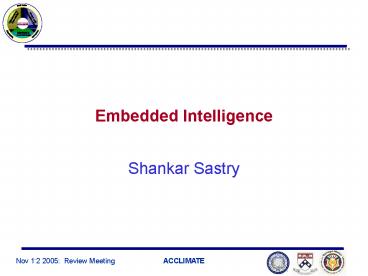Embedded Intelligence - PowerPoint PPT Presentation
1 / 13
Title:
Embedded Intelligence
Description:
Twin Rotor Electric tailless helicopter for maneuvering in urban spaces ... Pursuit Evasion Games (looking for terrorists) in the midst of green non-combatants ... – PowerPoint PPT presentation
Number of Views:363
Avg rating:3.0/5.0
Title: Embedded Intelligence
1
Embedded Intelligence
- Shankar Sastry
2
The Changing Nature of Urban Combat
- Long term surveillance needed
- Low concentrations of the enemy in complex
terrains - Need for dismounted warfighter ops in complicated
urban and mountainous terrains - Need for low cost disposable sensor webs, fixed
and mobile - OAVs and MAVs provide the vital 3rd dimension
3
Technology Challenges
- Groups of MAVs to be controlled efficiently
sometimes by a single dismounted warfighter - Need for conflict detection and resolution among
MAVs - Terrain Avoidance and Path Planning to avoid
threats - Tasking at mission level by distracted warfighter
- Need for networking of multi-sensor information
and data dissemination to queries from a single
blue team player - Sensor webs using information rich and info poor
sensors - Querying of distributed dynamic multi-modal data
sets - Communication of intelligence information among
blue forces using MAVs as communication nodes and
intel nodes. - Determination of Adversarial Intent
- Discovery of safe transit paths
- Targeting and prosecution of time critical
targets - Autonomous tasking of resource concentration
4
Technology Challenges Continued
- Secure, Fault Tolerant Networked Embedded Systems
- Authentication, Challenge Issual and Response
- Determination of misappropriation of sensor
resources through data anomalies - Integration of sensor networks with MAVs
- combining local geometric information with global
topological information - Combining long term intel with short term
adapting tactics, feinting, deception
5
Heterogeneous Swarms of MAVs
- Intelligent Tasking of MAVs
- MAVs need to fly around without running into
terrain or into each other and be taskable by a
warfighter at a high level without constant
teleoperation. - They also need to build maps inside buildings or
other urban areas. - Sensing is likely to be low resolution
(omni-directional) cameras and other power
sensitive but low resolution sensors. Efficient
extraction of global views from local maps
6
Heterogeneous Swarms of MAVs
- Coordinated Operations of groups of tactical
MAV/OAVs at company or individual warfighter
level needs - Formation flying to reach targets
- Change of formation in response to threats
- Target tracking and acquisition
- Modeling of Adversarial Actions
- Sensor Webs of Multiple TUAVs in response to
query from base station style OAV asking for
situational guidance.
7
PLATFORMS, PLATFORMS, PLATFORMS!!
Back pack sized 2.5 lb, 8000 ft. 100 mph, 45
minutes
Tankopter with RF detection devices for urban and
rubble filled terrain
Twin Rotor Electric tailless helicopter for
maneuvering in urban spaces
8
Current UAV Mass Spectra
UCB Smart bird
Aerovironment Black Widow 2.12 oz.
Boeing/ Insitu Scaneagle 33 lb
Gen. Atomics Predator B 7,000 lb
Stanford DFly
BAE Systems Microstar 3.0 oz.
Boeing X-45A UCAV 12,195 lb (est)
AAI Shadow 200 328 lb
NOAA Weather Balloon 2-6 lb
Aerovironment Pointer 9.6 lb
Allied Aero. LADF 3.8 lb
Northrop-Grumman Global Hawk 25,600 lb
Bell Eagle Eye 2,250 lb
0
1
10
100
1,000
10,000
100,000
UAV Weight (lb)
Micro
Mini
Tactical
High Alt / UCAV
Med Alt
courtesy Hansman, Weibel (MIT ICAT), Joint
FAA/National Academies Workshop, 05/04
9
Technology on the Horizon
- Small UAVs with
- Wide ranges of sensing modalities
- Abilities to perceive the environment
- Capabilities for autonomous behavior
- Capabilities to coordinate in groups
- Mobile, intelligent sensor webs
- Can provide embedded intelligence to the
warfighter
10
Technology Challenges Embedded Intelligence
- Mobile sensor webs to be controlled by a single
human - Translate global objectives to a set of local
objectives, one for each sensor - Algorithms, run on board the sensor, to reason
about and interpret the environment - Blending perception with control objectives
- Need for networking of multi-sensor information
and data dissemination to queries from a single
human - Sensor webs using both information rich and
information poor sensors - Querying of distributed dynamic multi-modal data
sets - Communication of intelligence information among
blue forces may rely on the sensor web
11
Smart, Adaptive Interfaces
- Problem Unless these mobile sensor webs can
properly interact with the human(s) deploying
them, their utility is limited - Smart interface a component of the mobile
sensor web that - Interprets commands, questions from the human
- Filters sensed information from the web to
provide to the human - Is clever develops a model of the human to
determine what information to provide, how, and
when, in order to maximize humans intelligence - Makes the sensor web an extension of the
senses, maximizes situational awareness
12
Sample Urban Ops Missions
- Mission Class Types
- Surveillance or intelligence gathering
(loitering, opportunistic in nature or directed) - Search And Destroy in hostile environment
(including generalized pursuit-evasion scenarios) - Pre-planned assault in hostile environment (time
critical target engagement). - Development of capabilities for teamed autonomous
UAVs to respond to changes in adversary tactics - Development of algorithms for autonomous UAV/UGV
and Sensor networks to respond to an intelligent
adversary. - Development of operational procedure templates
for UAV missions that exploit these algorithms. - Pursuit Evasion Games (looking for terrorists) in
the midst of green non-combatants - This is a mathematical abstraction of most urban
operations with varying patterns of partial
information, tactical templates.
13
Model Based Design Applications with Network
Embedded Systems
Pegs
Power Grids
HVAC systems
Human body
14
Sensor net increases visibility
Control and communication over Sensor Networks
Computational unit
15
INDOOR SENSOR WEB TEST BED December 2004

